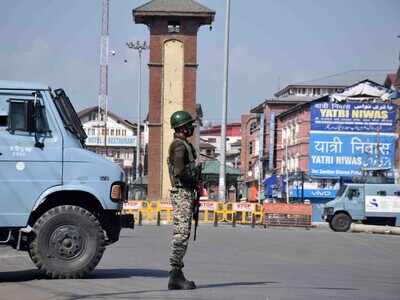Top Searches
- News
- India News
- Article 370 revoked: When BJP fulfilled its long-standing agenda
Article 370 revoked: When BJP fulfilled its long-standing agenda

NEW DELHI: One of the most important and also significant decisions of the Modi government in its second term was its move to revoke the special status and statehood of Jammu and Kashmir.
On August 5, 2019, a little over two months into a historic second term, Modi government divided Jammu and Kashmir into two Union territories and did away with its special status.
Article 370, combined with Article 35A, accorded Jammu and Kashmir special status under the Constitution of India, allowing it to have a separate constitution and a separate penal code among other legal distinctions.
The decision to end the special status for J&K marked fulfilment of BJP’s long-standing agenda and its 2014 poll manifesto promise.
While PM Modi called it 'a historic decision', the opposition leaders termed the move a "catastrophic step" and "a black day for democracy".
The government imposed a number of restrictions in Jammu and Kashmir including suspension of pre-paid mobile phones and all internet services, triggering criticism from leaders from opposition parties and activists across the country.
The government explained the move as being aimed at pre-empting any violence that the announcement might trigger.
It also placed prominent leaders such as former chief ministers Omar Abdullah and Mehbooba Mufti of the National Conference (NC) and the People’s Democratic Party (PDP) respectively under house arrest. It also imposed curfew and Section 144 in most parts of the erstwhile state. Various educational institutions in Kashmir also directed their students to vacate hostels.
The United Nations expressed concern over "restrictions" in Jammu and Kashmir saying that the curbs "could exacerbate the human rights situation in the region". Human Rights Watch mentioned that basic freedoms were at risk in J&K, and urged India to restore normalcy in the region.
In response, the government asserted that a number of countries were briefed about Article 370 and told them it is an "internal matter" of India.
The mainstream political parties in Jammu and Kashmir formed an alliance for restoration of Article 370 and it was named 'Peoples' Alliance for Gupkar Declaration'.
The alliance pledged to strive for restoration of the constitutional position in respect of Jammu and Kashmir as it existed before abrogation of Article 370.
Union home minister Amit Shah has announced that J&K will get back its statehood at an "appropriate time". However, when that "appropriate time" will come remains to be seen.
On August 5, 2019, a little over two months into a historic second term, Modi government divided Jammu and Kashmir into two Union territories and did away with its special status.
Article 370, combined with Article 35A, accorded Jammu and Kashmir special status under the Constitution of India, allowing it to have a separate constitution and a separate penal code among other legal distinctions.
The decision to end the special status for J&K marked fulfilment of BJP’s long-standing agenda and its 2014 poll manifesto promise.
While PM Modi called it 'a historic decision', the opposition leaders termed the move a "catastrophic step" and "a black day for democracy".
The government imposed a number of restrictions in Jammu and Kashmir including suspension of pre-paid mobile phones and all internet services, triggering criticism from leaders from opposition parties and activists across the country.
The government explained the move as being aimed at pre-empting any violence that the announcement might trigger.
It also placed prominent leaders such as former chief ministers Omar Abdullah and Mehbooba Mufti of the National Conference (NC) and the People’s Democratic Party (PDP) respectively under house arrest. It also imposed curfew and Section 144 in most parts of the erstwhile state. Various educational institutions in Kashmir also directed their students to vacate hostels.
The United Nations expressed concern over "restrictions" in Jammu and Kashmir saying that the curbs "could exacerbate the human rights situation in the region". Human Rights Watch mentioned that basic freedoms were at risk in J&K, and urged India to restore normalcy in the region.
In response, the government asserted that a number of countries were briefed about Article 370 and told them it is an "internal matter" of India.
The mainstream political parties in Jammu and Kashmir formed an alliance for restoration of Article 370 and it was named 'Peoples' Alliance for Gupkar Declaration'.
The alliance pledged to strive for restoration of the constitutional position in respect of Jammu and Kashmir as it existed before abrogation of Article 370.
Union home minister Amit Shah has announced that J&K will get back its statehood at an "appropriate time". However, when that "appropriate time" will come remains to be seen.
FacebookTwitterLinkedinEMail
Start a Conversation
end of article
Quick Links
Coronavirus in MumbaiFarm bill 2020Farmers protestCoronavirus in DelhiCoronavirus in BangaloreCoronavirus symptomsCoronavirus in IndiaWest Bengal elections 2021Coronavirus NewsSolar EclipseNPRWhat is NRCCAB BillCAB and NRCAssam election 2021Podcast newsLok SabhaTamil Nadu Election 2021CongressBJP newsKerala Elections 2021Indian ArmyISRO newsSupreme Court
